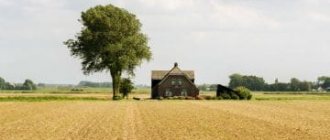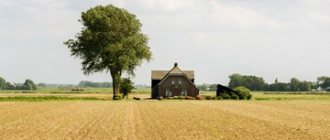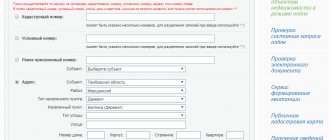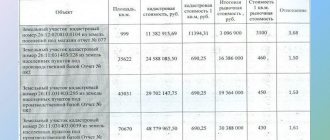Pravozhil.com > Real estate registration > Land registration > Who can receive a land share and what is allowed to do with it?
The legislation provides private owners with several ways to obtain a land share for personal needs. In addition to the traditional purchase/sale, you can become the owner of a plot on a shared basis. Using legal terminology - to receive a land share.
How to get a land share in Russia and what to do with it, what legal opportunities such property provides to the owner and how to register it correctly will be discussed further.
What is a land share?
How to get a share in land in Russia?
What are land shares? We are talking about the form of ownership of land exclusively for agricultural purposes.
A land share is a citizen’s shared ownership of a common plot. It is not prohibited for a legal entity to receive a share. The area is calculated in hectares, including per user. is issued free of charge.
In fairness, it must be stated that the share of one owner in the legal sense is not a personal plot. Why?
- Share boundaries exist exclusively on paper, but on the ground the matter is done without land surveying. It implies only the right to an allotment in the general area, and not the allocation of property in kind.
- The use of shared land should not violate the rights of other owners, therefore there are many restrictions for this ownership format.
Share ownership is a shaky concept. At any time, it can be taken away by the municipality as unclaimed land or used for other purposes.
How to check a plot by cadastral number?
During the registration process, you registered the plot of land with the cadastral register - otherwise, it would seem that it would not exist in the legal field, so it is somehow impossible to skip this stage. Verification by cadastral number is necessary to ensure that the registration operation is completed.
IMPORTANT! If you don't want to do the inspections yourself, you can pay a private organization to do them. But this is more true if you are a buyer rather than a seller.
The entire procedure is now available online. To check, you need to go to the Public Cadastral Map - information is available there about all the plots that have ever been registered in the cadastral register.
How to use:
- Enter the exact address of the site in the line located in the left corner.
- If you don't know the address, find your site manually on the map by zooming in.
- Find your site and see what number it is listed under.
The public cadastral map is not an official website, so you can only get information from there for personal use. For documentary confirmation, you will need the Federal Service for State Registration of Cadastre and Cartography (Rosreestr).
Land share - what to do with it? Legal regulation
- Land Code of the Russian Federation.
- Federal Law No. 101 “On the turnover of agricultural land.”
- Federal Law No. 221 “On the State Real Estate Cadastre”.
- Federal Law No. 218 “On State Registration of Real Estate” (new law of 2021, replacing Federal Law 122).
Essentially, the share provides the owner with the opportunity to engage in crop production for his own needs. To carry out land alienation operations, registration of ownership will be required. But that’s “a completely different story.”
Legislative standards in 2022
Everything related to shares in 2022 is described in Federal Law No. 101. Particular attention of the state is aimed at controlling who and how many share rights to state land are issued, as well as using them for their intended purpose. During the functioning of the Russian Federation as a separate state, bills appeared that in every possible way limited the misuse of shares or being in property without registration.
IMPORTANT! According to Art. 1 Federal Law No. 101 “On the turnover of agricultural land” the main (but not the only) condition for owning a plot based on the right to a share is its intended use - that is, for agricultural purposes. Such a requirement is made by the state in order to protect agricultural potential.
There are other restrictions that must be taken into account when planning your interaction with this type of shared ownership. The most important of them is that even a registered land plot can be taken away for inappropriate use - this is regulated by Art. 6 Federal Law No. 101.
Main restrictions for owners of land plots:
- Privatization is possible at the request of the owner and if he has the funds, but not every plot can be registered in this way.
- Foreigners cannot either use such land or privatize it - this is necessary to preserve the ownership of state land for citizens and prevent the mass purchase and maintenance of land by large foreign owners (Article 3 of Federal Law No. 101).
- The boundaries of the plot depend on the area in which the share is allocated, but the maximum possible share is always at least 10% of the total land in a particular region (Clause 2 of Article 4 of Federal Law No. 101). Within these values, government bodies of the constituent entities of the Federation can independently determine the size of allotments.
Owning a share, subject to registration, is not much different from owning any other property (except for the restrictions indicated above). The owner can independently choose how to dispose of the land in shared ownership, and after privatization (acquisition of a share in personal ownership), these prohibitions also disappear.
Registration of land share
How to register a land share?
First, the land needs to be demarcated and registered with the state real estate register. Only after this can you begin to register your share. But these are the concerns of the owner of the total land mass.
The applicant for the share will have to apply to the land commission of the agricultural enterprise for a decision on the provision of the share. If the application is approved, the shareholder receives a corresponding certificate indicating:
- share size in points and hectares;
- type of ownership (arable land, pasture, etc.).
Now the share is registered as property. To do this, you need to obtain title documents for the land:
- Certificate of ownership.
- Cadastral extract and technical plan of the site.
Please note that you should start by checking the legal compliance of the technical documentation. A site plan (or technical passport) and a cadastre extract are needed to complete legal papers. If the cadastral passport is outdated or does not exist at all, land management work is carried out. In general, the stage takes from 1 to 2 months.
Legal documents are issued through the territorial department of Rosreestr at the location of the land. The following package is provided to the authority:
- minutes of the meeting of the board of the agricultural enterprise with a copy of the decision;
- shareholder certificate;
- technical documentation for the land;
- confirmation of payment of the state duty for registration of the plot.
If a representative is involved in registering the share, a notarized power of attorney is required.
The process of privatization and allocation of shares: main features
Privatization is the final stage, the acquisition of land (determination of value) and its release from state status. As a fact, privatization is possible only after separation (registration).
Read more about how the value of a land share is determined in our article.
Allocation of a share is a process that allows you to convert the right to an abstract plot of land into the right to use a specific plot under the law. After completing all the necessary actions, the owner is left with an allotment that he can use within the framework of the law or privatize.
How to achieve allocation of a share?
Local authorities will deal with this. For example, in rural areas you need to find a local administration, where they will tell you how to proceed. The main task at this stage is to declare and confirm your ownership of the plot.
Required documents:
- application for the allocation of a share - written according to the sample on the spot or in advance;
- identification documents (for verification);
- papers that confirm your right to own a share.
Please note that if you received a share by inheritance, then first you should transfer the right to it to yourself. Without this, the share will be considered the property of the deceased and local authorities will not help you allocate it in any way.
Submit your documents to your local government and wait for a decision. If the decision is positive, you will be given your plot in kind. At this stage, you will already know exactly where it is and what boundaries it has.
The next stage is to determine the technical characteristics for the site. Since it has only been allocated, there is no technical documentation for it - it must be completed independently by contacting a special organization - land management. After paying for their visit and measurements, you will receive documents in your hands.
The last stage is certification of ownership of the site with technical documentation. All that remains is to take the site documents for certification. For these purposes, you can choose either a government agency (the subject of registration of rights in your region) or a private specialist, a notary. Payment is required in both cases, and the notary will cope with the task much faster.
How to privatize a share?
Once you have secured the allocation of a share, it is considered formalized - that is, it cannot be reorganized, but you, as the owner, are still subject to legal restrictions. To remove them, you need to go through the privatization process.
As soon as you re-register the plot as private property, you can do whatever you want with it - buy a modular house for installation, begin full-fledged construction, use it for a variety of purposes.
During the process, you will have to pay for the procedures necessary to register the site outside state ownership:
- creation of a cadastral plan;
- land surveying (translation of abstract hectares into real boundaries);
- obtaining personal documents for the site with changes from the previous paragraphs.
After this, there will be no problems with the land - it will be possible to perform all the manipulations that are available for ordinary property. If any errors or inconsistencies arise, you must go to court.
How to sell a land share?
Since not all of their owners can and want to use share plots for their intended purpose, procedures for the purchase and sale of such property are very popular. In order to sell your plot, you must first find a buyer.
Read more about how to sell a land share in our article.
If your share of agricultural land is allocated in an area that is most suitable for agriculture, then an offer to buy it may come from someone who wants it - often business owners or those who plan to become one pre-purchase the land for its intended use.
If you have not received such an offer, then submit a request yourself, using online platforms or regular advertisements. You can also independently look at the advertisements of the other party, where buyers list the requirements for the location and size of the plot.
IMPORTANT! Remember that you cannot sell your share to a foreigner - only to a citizen of the Russian Federation. Otherwise, the transaction will be considered invalid.
Such a purchase and sale transaction is drawn up in the same way as a regular one. After its completion, you lose all rights to the allocated area. The purchase of a share of agricultural land by you from another person will be carried out in the same manner.
What opportunities does a land share provide?
What can you do with your land share?
Well, now let's talk about the most important thing. What can be done with land shares, what benefits does the owner receive?
With proper management of the rights, the share will bring great benefits to its owner. The following actions are possible with the share:
- purchase/sale;
- exchange for other real estate;
- rental to a third party.
Taking into account the current land laws, the most profitable disposal of the share seems to be leasing or transferring it to trust management.
How to sell a share?
If the owner expects to sell his share, it is worth remembering the right of first refusal for other shareholders of farmland. Both individuals - shareholders and legal representatives - collective farms/state farms, peasant farms, municipalities have the right to act as a buyer.
Key points of the deal:
- before the sale of the share, the plot is allocated in kind;
- the agreement is concluded in simple written form in accordance with the requirements of the land code of laws and the Civil Code of the Russian Federation;
- the transfer of ownership, and not the specific transaction, is subject to registration in Rosreestr;
- shares can be purchased only for the production and receipt of agricultural products;
The share purchase/sale agreement must contain the following points:
- details, personal/statutory data of the parties;
- description of the land plot: exact coordinates on the ground, legal address;
- details of the seller's share certificate;
- accurate valuation of the share and sale price;
- capacity and good will of the parties when concluding an agreement;
- absence of mutual claims regarding the transaction.
A one-time payment or in installments is allowed, but in the second case the monthly payment will be higher than when renting an allotment.
Lack of demand for agricultural land
The state is interested in ensuring that most of the land that was allocated as agricultural land in 1991 remains in this status. It was assumed that a large number of private landowners who would grow crops on allocated shares would have a beneficial effect on the country’s economy.
This leads to one of the main points that protect state land from inappropriate use - the plot received under the right to a land share must be used for agricultural purposes. This rule can only be circumvented by purchasing the land as personal property.
If the owner did not do this, and also did not enter into a contract of sale or lease of his share, the land is considered unclaimed by the state. In the case where the owner has not registered the plot at all for a long time and only has the right to a share, the same applies.
Donation of a share
Is it possible to donate a land share?
The procedure for donating a share is in many ways similar to the alienation for compensation:
- Before conducting a transaction, the owner must check the availability of a certificate of ownership of the share.
- The deed of gift itself does not need to be registered, but the transfer of ownership requires state verification in Rosreestr.
- It is necessary to notify the other participants of the partnership about the upcoming donation. But, unlike the purchase/sale, here the co-owners have no rights of non-primary possession, since the land is transferred free of charge.
Donation algorithm
- preparation of documents for concluding an agreement;
- drawing up a deed of gift independently or with the help of professional lawyers (optimally through the services of a notary);
- signing a contract;
- state registration of transfer of rights;
- transfer of land according to the deed.
Due to the simplified mechanism for carrying out, under the guise of donation transactions, a simple purchase of farmland by interested parties is carried out.
Professional players in the land market are aware of ensuring the financial and legal security of fictitious land transfers. But it is better for ignorant citizens not to try to circumvent the law:
- the buyer may not pay the bill, and the law will be on his side;
- if the truth comes out, the deal may even be declared invalid in court.
In the case of a purchased share
A land share, like any property, is bought and sold. In order for the transaction to be considered valid and no problems arise in obtaining ownership rights, the new owner must go through the procedure of registering ownership rights in Rosreestr . To do this you need:
- Contact from the buyer;
- Receipts for payment of state duty;
- Copies of passports from both parties;
- Agreement of the administration to transfer the site into the ownership of another person;
- Evidence of the fact of informing other owners of the land share;
- An agreement drawn up with the seller’s side;
- Agreement on the transaction of the legal spouse selling the land share;
- An act certifying the legality of rights on the part of the seller.
If desired, the new owner of a land plot can separate it from the general plot by organizing a meeting of all owners through land surveying. Or use this land under the same conditions as the previous owner.
Rental
The land law allows the transfer of land shares for rent. At the same time, one should not lose sight of respect for the rights and interests of other co-owners.
A lease agreement is concluded between the parties indicating:
- duration of the agreement. This can be either a long-term or short-term arrangement. When transferring an allotment for a period of 1 year or more, the agreement is subject to state registration in Rosreestr;
- detailed conditions for the use of land by the tenant;
- rights and obligations of the parties;
- terms and frequency of payment. By law, both cash and in-kind payments are acceptable.
Since share rights do not imply clear boundaries in reality, when renting a plot, it makes sense to allocate the land in kind. Then additional land surveying will be required.
Registration of an agricultural share as an inheritance
Receiving a land share as an inheritance is not much different from accepting ordinary inherited property. The heir can receive it only upon the death of the testator as a compulsory share or by will.
As with any other property, the heir has the right to refuse the inheritance or simply not register it in his own name - after six months the plot will be recognized as unclaimed and will return to state ownership. This decision is made if obtaining a plot of land is not worth the effort - it is inconveniently located, the heir does not need it, or there is a tax. If you can’t decide, a few tips from lawyers – lawyers and notaries – will help.
Allocation of shares in kind
What needs to be done to have the right to dispose of a land share?
This procedure will be needed in transactions involving a change in the owner of a share, as well as when registering a “virtual” right to tangible property with the possibility of full disposal.
This is a troublesome matter, depending on the site, the legal form of the agricultural enterprise, and the characteristics of the shareholders' partnership.
But there are also general steps that almost any applicant must take:
- in regional print and electronic media (only official) it is published about the upcoming allocation and registration of a shared plot of land;
- a month later, a general meeting of shareholders, where the technical parameters of the allocated share are clarified and agreed upon;
- Now it’s time for land surveying – this is the longest stage. It can even last beyond one year;
- Upon completion, the boundaries are agreed upon with neighbors and government authorities. On average, the stage takes up to 30 days;
- Now it’s time to receive a cadastral plan for the site and assign a cadastral number.
Only after the favorable completion of all these “ordeals” is the owner issued a title document.
There are two options for allocating a share: for one owner and for a group of shareholders. Only the first method allows you to become a full owner of land.
You can find out how to receive land from the state by watching the video:
See also Phone numbers for consultation 06 Dec 2021 kasjanenko 1133
Share this post
Discussion: 4 comments
- 5master5 says:
03/07/2019 at 16:36I didn’t quite understand from the article. The relative had a share that was not properly registered. After his death, it is clear from the article that his closest relatives or family members will not be able to register it themselves and receive it as an inheritance? That is, while he was alive and it was necessary to register, but after death the share would be taken away?
Answer
Lenin says:
04/02/2019 at 16:21
Yes, they will take it away
Answer
08/20/2019 at 12:17
An agricultural enterprise cultivates land, which is a collection of land shares. The company does not have ownerless land. Where will it get the land to provide social services? worker, for example, land?
Answer
09/08/2020 at 23:09
If a group of people have been leasing their land shares to one company for a long time, how can the owner of one of the shares refuse to participate in the transaction and receive his share for his own use?
Answer










